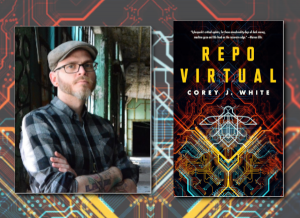9 Questions for Corey J White (REPO VIRTUAL)
Corey J. White is the author of The VoidWitch Saga – Killing Gravity, Void Black Shadow, and Static Ruin – published by Tor.com Publishing. He studied writing at Griffith University on the Gold Coast, and is now based in Melbourne, Australia.
Hey Corey, thanks for agreeing to do this!
I want to start with a bit of an ice-breaker question. In Repo Virtual your protagonist JD is initially quested by the representative of a cult-like religious group who are after a certain political (and post-human) change? Do you for one welcome our incoming AI overlords?
I mean, that’s kind of the central point of the entire book 😉
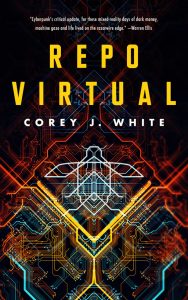 I don’t welcome our future AI overlords, assuming that those AI are going to be coming out of Silicon Valley and/or the military-industrial complex (especially considering the Venn diagram between those two is slowly becoming a circle). In the book I’m deliberately looking at AI as a sort of child species – something to be raised with compassion and kindness, rather than as a tool to be used to make money or win wars (or make money while winning wars). We’re talking about the possibility of creating a new race of sentient beings who don’t share our same reliance on Earth’s biosphere, and who could easily travel among the stars carrying memories of us long after we’ve ceased to exist. The alternative is to create a race of sentient slaves and then deny that it’s actually slavery because they aren’t “real people”. I could go into that line of thought further, but I’d just end up paraphrasing the book.
I don’t welcome our future AI overlords, assuming that those AI are going to be coming out of Silicon Valley and/or the military-industrial complex (especially considering the Venn diagram between those two is slowly becoming a circle). In the book I’m deliberately looking at AI as a sort of child species – something to be raised with compassion and kindness, rather than as a tool to be used to make money or win wars (or make money while winning wars). We’re talking about the possibility of creating a new race of sentient beings who don’t share our same reliance on Earth’s biosphere, and who could easily travel among the stars carrying memories of us long after we’ve ceased to exist. The alternative is to create a race of sentient slaves and then deny that it’s actually slavery because they aren’t “real people”. I could go into that line of thought further, but I’d just end up paraphrasing the book.
At the moment I don’t see my hopeful vision of a child species coming to light, if only because our anthropocentric tunnel vision makes it (seemingly) impossible for us to respect the lives and personhood of non-human animals, so I don’t expect us to do the same for an intelligence we create. But I hope that maybe some people working in areas related to AI might read the book and reconsider the way they approach their work.
You wrote a post for Tor.com on Five Cyberpunk Novels About the Now. You deliberately didn’t mention the big names of cyberpunk like Gibson, Sterling, or Pat Cadigan. I really loved that. Author Austin Kleon says that we should look at the world and write the book we think is missing – was this the case with Repo Virtual?
It’s hard to say, because science-fiction is such a rich field that whatever ideas or themes I wanted to explore are probably already out there somewhere, even if I haven’t come across them myself. But Repo Virtual was certainly written as a response – both a response to that first wave of cyberpunk fiction and a response to the increasing cyberpunkification of our world and lives. In a lot of ways, cyberpunk has become a retrofuturist aesthetic more than anything else, and while I love that aesthetic as much as the next sci-fi nerd, it doesn’t always feel like enough.
So with Repo Virtual I set out to write something that was a proper 21st Century take on cyberpunk, entirely free of nostalgia, and grounded in our cyberpunk now. And I was also really interested in writing about the personhood of non-biological intelligences as a way to provide a counterpoint to sensationalist Skynet fearmongering. I don’t know if either of those ideas were “missing” exactly, but I hadn’t come across them in a way that really spoke to me.
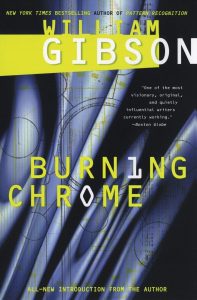 If you had to choose (I’m making you!) which cyberpunk novel would be your favorite recommendation and why?
If you had to choose (I’m making you!) which cyberpunk novel would be your favorite recommendation and why?
Not a novel, strictly speaking, but if I could only recommend one cyberpunk book, it would probably be William Gibson’s short story collection Burning Chrome. More than any single novel I think it works as the best encapsulation of what cyberpunk is, and what it can do. After reading Burning Chrome there are a hundred paths you can take from there, but it’s possibly the best starting point.
I can still vividly recall images from the story Dogfight (which Gibson wrote with Michael Swanwick) from the first time I read it almost twenty years ago.
Before Repo Virtual you wrote a space opera trilogy, the VoidWitch Saga. So … why cyberpunk? Why a heist?
I think there was always a cyberpunk slant to the VoidWitch books – with some of the tech I describe and the subcultures I explore, and with its anti-imperialist and anti-authoritarian perspective. So, it never felt like a big shift to move from (my version of) space opera to cyberpunk – it was more an adjustment from a far future setting to the near future.
Beyond that, cyberpunk was a subgenre I loved, so of course I was going to want to write in it one day. And with our current mundane-cyberpunk reality, it made sense to write this book before moving on to something different and (hopefully) entirely new.
As for the heist, I think I settled on that narrative device because I wanted to tell the story of the discovery/awakening of an AI, but I’m not a hard science-fiction writer, so there was no possibility of me writing the story of the person who created the AI. And if I’m not writing the story of the creator, then I need another way in, and what better way in than with a set of lockpicks and a getaway van?
Writing can be a way to work through your own issues in the hope that you can help others struggling to work through theirs. Was this the case for you in Repo Virtual?
The VoidWitch books were a place for me to work through some issues, but I think Repo Virtual was more a case of me working through some ideas and trying to decide what I think/how I feel about some of these issues using fiction. If there are personal issues I’m working through, they’re mainly related to my pessimism about the future and the slow apocalypse we’re living through with climate change. I’m not done working through that yet, and I won’t be until I see some concerted effort from our governments and the corporate polluters…
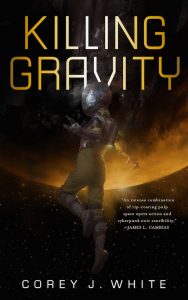 Can you talk about your creative process? What did it look like for Repo Virtual and has it changed from VoidWitch?
Can you talk about your creative process? What did it look like for Repo Virtual and has it changed from VoidWitch?
I always have a pretty extensive plan in place before I start work on a long-form project, so the biggest difference was in scale. The VoidWitch Saga was a trilogy of novellas, whereas Repo Virtual is a full-length novel. With a novella you only really need one POV character and one main plotline, but with a novel, you’re possibly going to find that you need multiple points of view, a bigger cast of characters, and at least one subplot. All that extra complexity means there’s a lot more you need to hold in your head, which makes the whole process a lot more difficult.
Also, the near future setting of Repo Virtual meant I needed to pay close attention to the world and the constantly-accelerating weirdness of our times.
What do you hope your readers take away from Repo Virtual?
Wariness about the situation of precarious employment that Silicon Valley and our neoliberal governments are trying to sell us. Scepticism at the cultish devotion to tech figures, billionaires, and politicians. A consideration of and for the personhood of non-human animals and non-biological intelligences. And a reminder of the importance of family – whether blood or found, whichever works for you.
Tell us about the Nothing Here Newsletter or Oh Nothing Press?
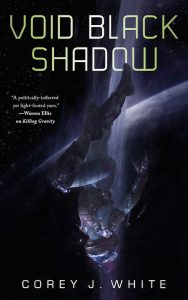 Nothing Here came about because I wanted to have some sort of regular output/contact with the world, but I didn’t want to simply write another author newsletter (or more to the point, I didn’t think anyone would want to read it). I like the sort of banter you get on a good podcast, but hate my voice, so a podcast was out of the question. So I came up with the idea of doing a group newsletter. The team is me, science-fiction author Marlee Jane Ward, dark futurist m1k3y, and designer/writer/tech-critic Daniel Harvey, plus the occasional guest we’re able to wrangle. We share links on current affairs, tech, culture, politics (but no US electoral politics, don’t worry), climate change, and whatever else we find that takes our collective fancy. Plus, we make recommendations for books, films, podcasts, etc we’ve been enjoying, sometimes talk writing process, and more. The newsletter is coming up on its 2nd birthday, and I’m proud of what we’ve done with it.
Nothing Here came about because I wanted to have some sort of regular output/contact with the world, but I didn’t want to simply write another author newsletter (or more to the point, I didn’t think anyone would want to read it). I like the sort of banter you get on a good podcast, but hate my voice, so a podcast was out of the question. So I came up with the idea of doing a group newsletter. The team is me, science-fiction author Marlee Jane Ward, dark futurist m1k3y, and designer/writer/tech-critic Daniel Harvey, plus the occasional guest we’re able to wrangle. We share links on current affairs, tech, culture, politics (but no US electoral politics, don’t worry), climate change, and whatever else we find that takes our collective fancy. Plus, we make recommendations for books, films, podcasts, etc we’ve been enjoying, sometimes talk writing process, and more. The newsletter is coming up on its 2nd birthday, and I’m proud of what we’ve done with it.
Oh Nothing Press was set-up so we could produce whatever weird and wonderful ideas we couldn’t shake out of our brainholes. We’ve released two capsules to date – the first being MechaDeath, a cosmic black metal mecha warfare story told with a meticulously designed zine and gnarly t-shirts. The second capsule was Creeper Magazine issue 1, and our third capsule will be Creeper issue 2. I sometimes say that Creeper is about the horror of The Now, but that doesn’t really say much about the content, so, to quote: “Weird crime, conspiracies, paranoia, folklore, the occult, modern myth, bizarre philosophy, fringe tech and genre-exploding fiction. CREEPER is the sort of magazine that could never exist in the mainstream, so we had to make it ourselves!”
It’s interesting watching themes and through-lines come through as we’re putting together Creeper 2, so I’m keen to see it out in the world later this year.
Lastly, my favorite question: Forget about writing for a moment. Forget about your book. Forget about your characters, your plot. Forget about your ideas for a sequel. FORGET ABOUT WRITING! What’s got your interest at the moment? What are you excited about? What are you angry about? What are you preoccupied with? Tell me all about that, and then… Tell me if you think it’s going to affect the next thing you write, and if so, in what way.
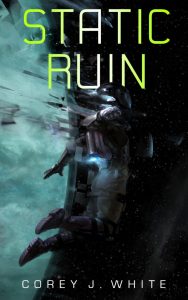 If you’re not angry at the state of global politics, the economy/rampant capitalism, and our inaction on climate change, then you’re not paying attention (and you should subscribe to Nothing Here because we’ll give you plenty to be angry about), but I don’t want to go into that now because I‘ll go into a rage spiral.
If you’re not angry at the state of global politics, the economy/rampant capitalism, and our inaction on climate change, then you’re not paying attention (and you should subscribe to Nothing Here because we’ll give you plenty to be angry about), but I don’t want to go into that now because I‘ll go into a rage spiral.
Timothy Morton’s Humankind has got my interest currently. It’s challenging and interesting, and with its subtitle ‘Solidarity with non-human people’ it’s feeding into the areas of thought I mentioned before around the personhood of non-human animals (though he extends his solidarity beyond even that).
I’m excited about some big news my partner has that neither of us can talk about yet. Beyond that, I’m not sure – a couple of things I was excited about have been cancelled due to plague, and with all the uncertainty in the air, it can be hard to find things to be excited about. Though I’ve got a couple of story/book ideas kicking around, including a collaboration, and that early idea-heavy phase of a new story is always fun.
And I’ve had the Yuri!!! On Ice theme song stuck in my head since rewatching it with my housemate over the weekend – does that count as a preoccupation?
But yes, my anger and feelings about the wider state of affairs is definitely feeding into my work, and themes about our guilt, responsibility, and culpability in the face of mass extinction and climate catastrophe are going to feature heavily in my next novel (the first draft of which I finished a couple of weeks ago), and the sequel that I’ve already got in mind. And Morton’s Hyperobjects has already fed into my work before, so I don’t doubt that something in Humankind will speak to me in a similar way.
Thank you again, Corey!
You can find Corey J White on his website: http://coreyjwhite.com/ where you can discover more about his writing, what he’s reading, and the Nothing Here newsletter.
Repo Virtual is out now! If you’d enjoy a break from this timeline and have a hankering for cyberpunk aesthetics and cyberpunk themes of identity (here: the most interesting concept AI I’ve read in a long while), you should definitely check out this update to the genre. White has a knack for describing a near-future world in which you feel the grit despite the AR covering the city surfaces. Complete with robo-dogs, hacker heroes, evil corporations, and intense action sequences, Repo Virtual is definitely a fun punk read.
Repo Virtual is available from Amazon and other book shops.
